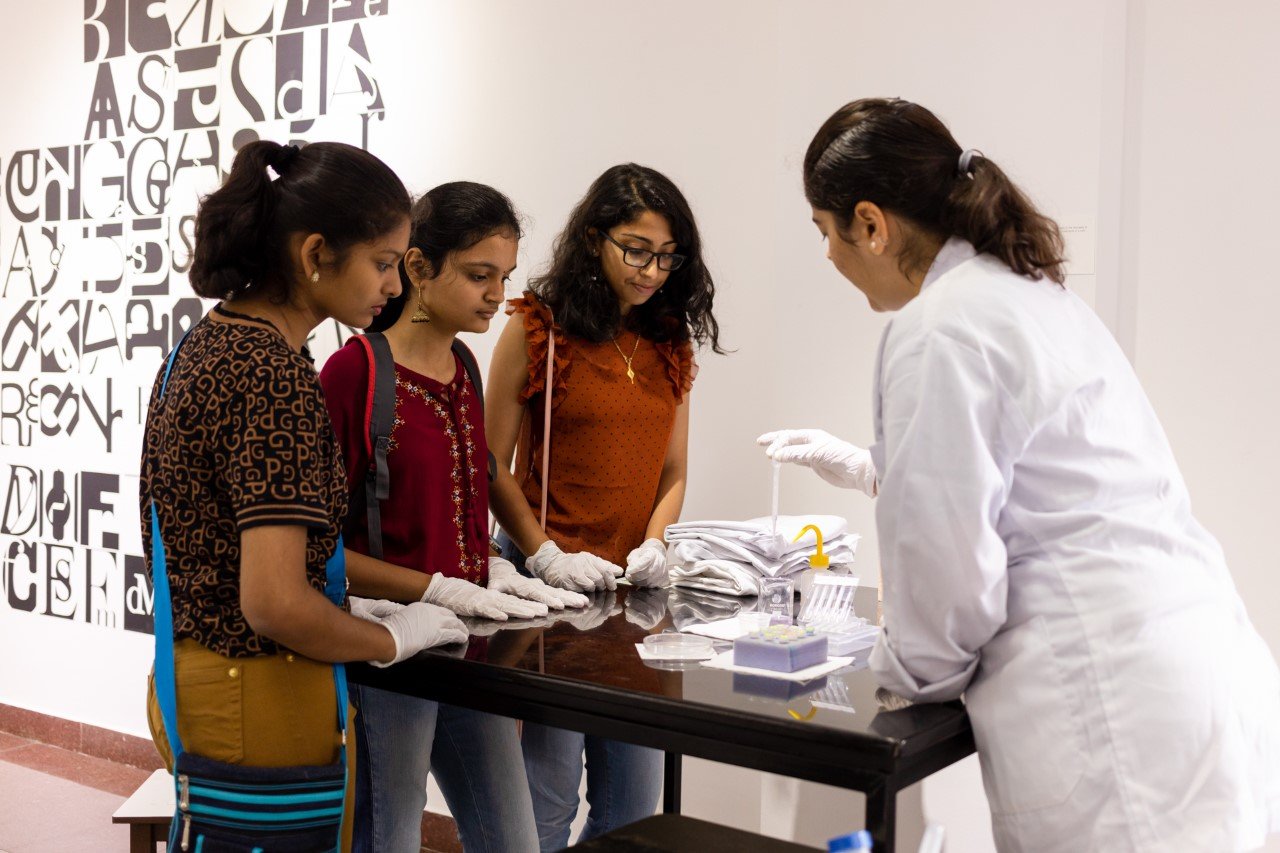Science Gallery Bengaluru
Shilpa Vijayakrishnan facilitates a book reading organised by the Museum of Art and Photography outside the UN Live portal.
In this post we meet the innovative Science Gallery Bengaluru, a one-of-its-kind hybrid in India. The Gallery and UN Live share a belief in the power of connection to drive positive global action, and the Gallery’s mission is to bring science back into the cultural conversation. Its ongoing initiatives unite young people from the natural and human sciences, engineers and artists, mentors them, and showcases their work in exhibitions and events that attract thousands of visitors every year.
We were thrilled to catch up with the Gallery team – Gayatri Manu (Senior Programme Associate), Dhriti Belliappa and Dhanush Sivadas (Climate Engagement Leads) – and they began by giving us a flavour of local issues. In densely populated Bengaluru, unplanned urbanisation makes waste management a top priority, while air pollution, deforestation, water scarcity and changing land use patterns are causing critical loss of biodiversity. This is especially damaging in a state (Karnataka) where most rural residents survive by agriculture.
Science Gallery mediator running an experiment with young adults.
We asked the Science Gallery team to share their experiences of facilitating climate conversations in the UN Live portal, at its home in the Jawaharlal Nehru planetarium. “It’s a treasure trove of knowledge!” said Dhriti, who recounted the visit of Sathya Sankaran, the Bicycle Mayor of Bengaluru, who is campaigning for cycle paths in a city where overcrowded roads are an everyday threat to cyclists. Through Global We, he reached out to people in other cities tackling the same issue, and gained new perspectives on active petitioning for change.
To the left: Dhriti Belliappa and Dhanush Sivadas by the portal. To the right: Gayatri Manu.
One of the most powerful conversations happened as Mansoor Gous – local waste management hero from NGO Hasiru Dala (Green Force) – joined the portal. Mansoor is legendary for going home-to-home in Bengaluru, reminding community members to be more conscious about managing waste (don’t mix wet and dry) and to use it to help the environment (for example as agricultural manure).
A Global We portal session in Bengaluru.
Mansoor’s advocacy was echoed by another portal guest – Ram Prasad, a well-known local expert on waste management, which he calls “one of the major contributing factors to climate change”. His Global We conversations with Bamako (Mali) were full of shared insights. “We know that many countries are not doing their waste management properly, either pushing it into the sea or putting it under the sun. It is not going to solve the problem. It will be a ticking bomb….” He reminded his portal audience of the value of small steps: “As an individual, we can be involved in climate change. See to it that the dry waste goes for recycling and the wet waste goes for composting. Whatever is compostable, you can compost at home. Put it in your own soil and use it. Even if this is done by individuals, you are going to change a lot of things”.
For Dhriti, the portal sessions offered something of an epiphany: “Ram Prasad talks about the detrimental effects of putting waste in landfill and something he said stuck with me. ‘You can plant trees, but if you don’t deal with waste management, what is the point?’”
Another of Ram Prasad’s passions is lake rejuvenation, and he’s skilled at advising climate activists how to navigate the complex legalities of lake protection. Says Dhanush, “I met him through his organisation Friends of Lakes and he immediately inspired me. Bengaluru, which had more than 2,000 lakes a couple of centuries ago, is down to just 200 and the water quality has suffered badly. There’s a lake near my home and 20 years ago it began depleting. Now the lake is home to 32 varieties of birds. His efforts are ongoing…
Elizabeth Yorke facilitates a biodiverse banana tasting by Edible Issues outside the UN Live portal.
Every Global We portal visitor agrees that we need to spread the word on climate change. Says Dhriti: “The big themes were educating people to understand our problem, rather than jumping straight into saying we want to solve it.” In the words of Ram Prasad: “You can have money, you can have policy, you can have everything. It can be in books. But it has to come on-the-ground. We have to see that there is implementation….. Awareness has to be created where people start to really participate and understand that what they do contributes highly to climate change.” The power of culture to drive climate education was top of mind when the conversation was joined, via the Global We portal in Kigali (Rwanda), by a campaigner who recycles clothes in rural communities. Activist Jacques told listeners: “….if you want to create awareness for the youth, you need to make sure you bring entertainment, because they come for entertainment, but also they learn other interesting topics like climate change, climate action.”
After hearing so many inspirational insights from the Science Gallery’s Global We sessions, we were excited for Gayatri, Dhriti and Dhanush to share their messages for climate leaders:
We are deeply grateful for the collaboration, support and leadership that Science Gallery Bengaluru has given to the Global We programme.
You can join the Global We conversation at the Science Gallery UN Live portal here. The portal is located at the Jawaharlal Nehru planetarium, Sri T, Sankey Rd, High Grounds, Bengaluru (tel: 80 2237 9725).
The Global We programme is supported by IKEA Foundation and powered by Shared Studios.
UN Live portals facilitate connections between people, collectives, initiatives, NGOs, organisations and leaders from all over the world. Join the Global We for Climate Action.








